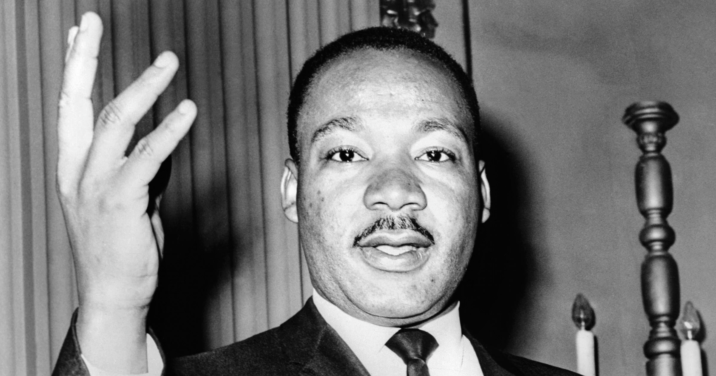Though best known as a civil rights activist, Martin Luther King, Jr. was first a minister, his faith motivating his zeal and commitment to social justice.

***
Martin Luther King, Jr. integrated the concept of agape (the spontaneous and overflowing love of God) into the theory of nonviolence in a way that gave it a more explicitly Christian tenor. But perhaps even more importantly, agape gave nonviolence a solid theological grounding. King understood God to be the source of agape. Indeed, following Swedish theologian Anders Nygren, he held that God is agape, as well as the means by which love is instilled into the hearts and souls of human beings. Nonviolence requires that one courageously confront and resist evil and injustice, but it also requires that it be done in the spirit of love.
Martin Luther King Jr.’s theory of nonviolence
The Kingian type of nonviolence requires love, but not a weak or sentimental kind. “It is a very stern love that would organize itself into collective action to right a wrong by taking on itself suffering,” King wrote. This is what makes Christianity so very difficult to live out, for as King observed during the Montgomery movement, “it demands a dangerous and costly altruism”—not just love of self but love of neighbor. For King, Christian agape was the highest good, “the most durable power,” and the “heartbeat of the moral cosmos.”
Having been influenced by Paul Ramsey, King held that agape is disinterested love, which means that it expects nothing in return. It has no concern for who the neighbor is. Everybody is one’s neighbor.
Under the influence of Nygren, King held that agape is the highest form of love and is “the most durable power in the world.” It is a love that is totally spontaneous and outpouring, whether its objects are the victims of the Virginia Tech tragedy on April 16, 2007, or the perpetrator in that tragedy, Tseung Qui Cho. According to King, every person is a recipient of God’s agape—God’s overflowing, inexhaustible love.
In addition, agape is redemptive love, the love of God working within human beings. Agape is directed even toward that which is deemed unlovable, and in reaching out to an object it actually imbues that object with value. The point of significance for King’s doctrine of nonviolence is that agape loves both because of and in spite of. One can love one’s enemies precisely because of God’s agape (or the love of God in persons). Love in this sense is “the core and heartbeat of the cosmos.”
King was also convinced that agape is a thoroughly communal or relational principle. That is, persons are not created to exist in isolation. Instead, they are created in and for relationship and community. Agape always seeks to create, preserve, and enhance community.1
***
Read more from this work in the Armchair Theologians Series (13 vols.).
Related articles
- Racial Diversity: John Stott on What It Means to Be a Peacemaker
- 5 Black Theologians from Church History You Should Know
- The Great Legacy of Charles Octavius Boothe
- Black History Is Family History
Related resources
- Letter from Birmingham Jail – by Martin Luther King, Jr.
- The Measure of a Man – by Martin Luther King, Jr.






